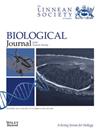Genetic structure of southern populations of Hydrochoerus hydrochaeris (Rodentia: Caviidae)
IF 1.5
3区 生物学
Q3 EVOLUTIONARY BIOLOGY
引用次数: 0
Abstract
The capybara (Hydrochoerus hydrochaeris) is a large semi-aquatic rodent with a broad distribution across South America. Although it is a relatively common and well-known species, there are few studies on its evolutionary history. Consequently, we decided to investigate the genetic diversity, population structure, and demographic history of capybaras, including new populations from its southern distribution range, by using a 226 bp fragment of the mitochondrial D-loop region. We found 16 haplotypes and populations, with moderate levels of haplotype and nucleotide diversity. In addition, the genetic structure analyses suggested high genetic divergence among populations, mainly among Pampean and Chacoan populations. We also found a consistent phylogeographical pattern with the distribution of main rivers. In agreement with palaeontological data, we propose two colonization pathways towards the south driven by main basins: Paraná–Paraguay and Uruguay–Atlantic.啮齿目(Rodentia: Caviidae)水蜗牛南方种群的遗传结构
水豚(Hydrochoerus hydrochaeris)是一种大型半水栖啮齿动物,广泛分布于南美洲。虽然水豚是一种相对常见且广为人知的物种,但有关其进化史的研究却很少。因此,我们决定利用线粒体 D 环区的 226 bp 片段来研究水豚的遗传多样性、种群结构和人口历史,包括其南部分布区的新种群。我们发现了 16 个单倍型和种群,单倍型和核苷酸的多样性处于中等水平。此外,遗传结构分析表明,不同种群之间,主要是潘潘种群和查科种群之间的遗传差异较大。我们还发现了与主要河流分布一致的系统地理学模式。与古生物学数据一致,我们提出了两条由主要流域驱动的向南殖民之路:巴拉那-巴拉圭和乌拉圭-大西洋。
本文章由计算机程序翻译,如有差异,请以英文原文为准。
求助全文
约1分钟内获得全文
求助全文
来源期刊
CiteScore
4.30
自引率
10.50%
发文量
140
审稿时长
3-6 weeks
期刊介绍:
The Biological Journal of the Linnean Society is a direct descendant of the oldest biological journal in the world, which published the epoch-making papers on evolution by Darwin and Wallace. The Journal specializes in evolution in the broadest sense and covers all taxonomic groups in all five kingdoms. It covers all the methods used to study evolution, whether whole-organism or molecular, practical or theoretical.d.

 求助内容:
求助内容: 应助结果提醒方式:
应助结果提醒方式:


